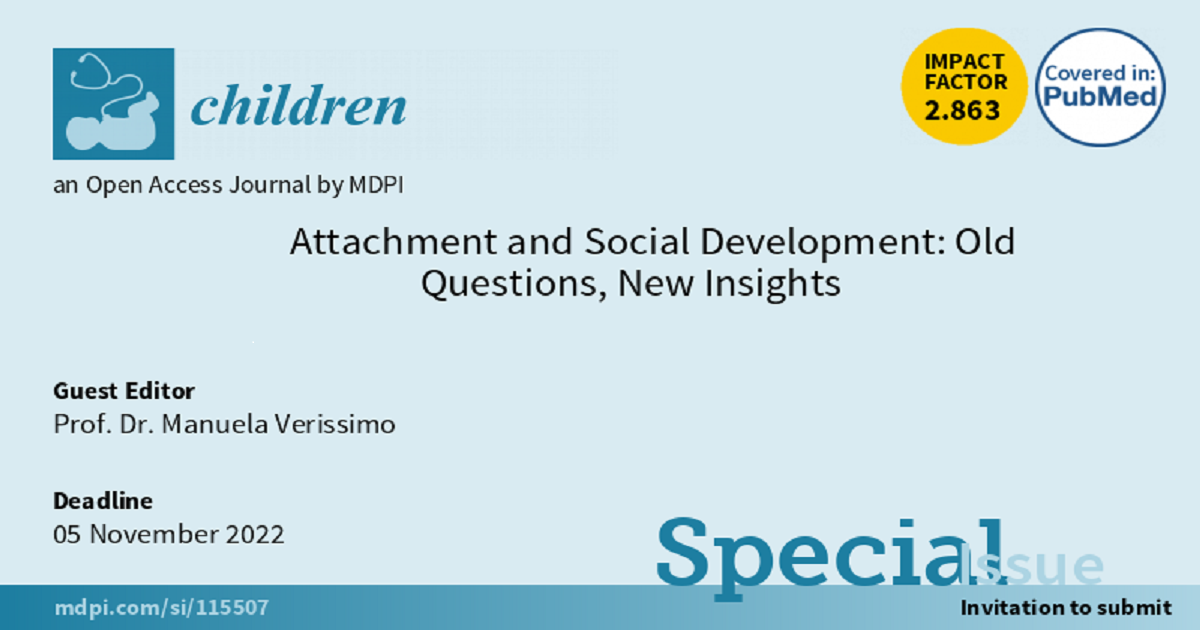- 2.1Impact Factor
- 3.8CiteScore
- 16 daysTime to First Decision
Attachment and Social Development: Old Questions, New Insights
Special Issue Information
Dear Colleagues,
This topic aims to emphasize the connection between the quality of secure-base relationships during infancy and childhood and a range of outcomes in the domain of social and emotional development. Social and emotional development refers to how children start to understand who they are, what they feel and what to expect when interacting with others. It is the development of being able to form and sustain positive relationships as well as experience, manage and express emotions. We believe that attachment theory needs to incorporate the notion that a child builds an attachment network in the first years of life that will constrain his/her development; in this sense, papers that include the role of the father/child interaction and relationship are especially welcome. Finally, we also invite papers profoundly embodied in both developmental and cross-cultural perspectives. Clinicians and researchers are invited to submit relevant original articles in both the clinical and research fields, articles, reviews, and case reports to this Special Issue of Children, “Attachment and Social Development: Old Questions, New Insights”.
Prof. Dr. Manuela Verissimo
Guest Editor
Manuscript Submission Information
Manuscripts should be submitted online at www.mdpi.com by registering and logging in to this website. Once you are registered, click here to go to the submission form. Manuscripts can be submitted until the deadline. All submissions that pass pre-check are peer-reviewed. Accepted papers will be published continuously in the journal (as soon as accepted) and will be listed together on the special issue website. Research articles, review articles as well as short communications are invited. For planned papers, a title and short abstract (about 100 words) can be sent to the Editorial Office for announcement on this website.
Submitted manuscripts should not have been published previously, nor be under consideration for publication elsewhere (except conference proceedings papers). All manuscripts are thoroughly refereed through a single-blind peer-review process. A guide for authors and other relevant information for submission of manuscripts is available on the Instructions for Authors page. Children is an international peer-reviewed open access monthly journal published by MDPI.
Please visit the Instructions for Authors page before submitting a manuscript. The Article Processing Charge (APC) for publication in this open access journal is 2400 CHF (Swiss Francs). Submitted papers should be well formatted and use good English. Authors may use MDPI's English editing service prior to publication or during author revisions.
Keywords
- emotional development
- child development
- father/child interaction
- social ethology
- emotions

Benefits of Publishing in a Special Issue
- Ease of navigation: Grouping papers by topic helps scholars navigate broad scope journals more efficiently.
- Greater discoverability: Special Issues support the reach and impact of scientific research. Articles in Special Issues are more discoverable and cited more frequently.
- Expansion of research network: Special Issues facilitate connections among authors, fostering scientific collaborations.
- External promotion: Articles in Special Issues are often promoted through the journal's social media, increasing their visibility.
- e-Book format: Special Issues with more than 10 articles can be published as dedicated e-books, ensuring wide and rapid dissemination.

